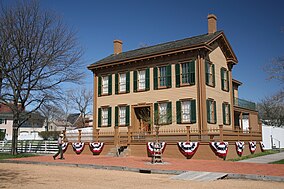Lincoln Home National Historic Site
| Lincoln Home Site | |
|---|---|
 | |
| Location | Springfield, Illinois, U.S. |
| Coordinates | 39°47′50″N 89°38′42″W / 39.79722°N 89.64500°W |
| Area | 12.24 acres (4.95 ha) |
| Established | August 18, 1971 |
| Visitors | 419,552 (in 2005) |
| Governing body | National Park Service |
| Website | Lincoln Home National Historic Site |
Lincoln Home National Historic Site preserves the Springfield, Illinois home and related historic district where Abraham Lincoln lived from 1844 to 1861, before becoming the 16th president of the United States. The presidential memorial includes the four blocks surrounding the home and a visitor center.
Historic site
[edit]In 1837, Lincoln moved to Springfield from New Salem at the start of his law career. He met his wife, Mary Todd, at her sister's home in Springfield and married there in 1842.
The historic-site house at 413 South Eighth Street at the corner of Jackson Street, bought by Lincoln and his wife in 1844, was the only home that Lincoln ever owned. Three of their children were born there and one, Eddie, died there. The house contains twelve rooms spread over two floors. During the time he lived here, Lincoln was elected to the House of Representatives in 1846, and elected President in 1860.
The Lincoln Home has been completely restored to its 1860 appearance.[1]
Lincoln's son, Robert Todd Lincoln donated the family home to the State of Illinois in 1887 under the condition that it would forever be well maintained and open to the public at no charge. This came as a result of tenants who would charge those who wanted to visit Lincoln's home and that many tenants tended to leave the home in disrepair. The home and Lincoln Tomb, also in Springfield, were designated National Historic Landmarks on December 19, 1960, and automatically listed on the National Register of Historic Places on October 15, 1966. The home and adjacent district became a National Historic Site on August 18, 1971[2] and is owned and administered by the National Park Service.
Other structures
[edit]
Along with the Lincoln Home, several other structures within the four-block area are also preserved. All the homes have been restored to their appearance during the time Lincoln lived in the neighborhood. Two of these structures, the Dean House and the Arnold House, are open to visitors and house exhibits on the life and times of Lincoln and his neighbors. In total, the buildings included in the park occupy 12 acres (49,000 m2)/ Other homes are still privately owned and occupied under regulation of the Park District.
Samuel Rosenwald purchased the Lyon House on Eighth Street across from Lincoln's home in 1868.[3][4] Samuel's son Julius Rosenwald went on to become president of Sears Roebuck and Company and a major philanthropist; the Lyon House was Julius's boyhood home.[3] A plaque was unveiled when the house was renamed in his honor in 2020.[5]
Neighborhood
[edit]Nearby in Springfield is the Old State Capitol where Lincoln served as a State Legislator, the building which housed the law offices of Lincoln and his partner William Herndon from 1844 until 1852, and the Lincoln Depot from which Lincoln left the city for his 1861 inauguration.
See also
[edit]References
[edit]- ^ IL 62701, 426 S. 7th St Springfield. "Lincoln Home National Historic Site". Enjoy Illinois.
{{cite web}}: CS1 maint: numeric names: authors list (link) - ^ The National Parks: Index 2001–2003. Washington: U.S. Department of the Interior. The NPS website for the park lists 1972; however the printed reference and the National Register listing both confirm 1971 as the establishment date.
- ^ a b "Lyon House". Lincoln Home. National Park Service. Retrieved August 23, 2020.
- ^ "Give While you Live: The Generosity of Julius Rosenwald" (PDF). National Park Service. National Park Service. Retrieved August 23, 2020.
- ^ Hansen, Mary (February 12, 2020). "Home In Lincoln Historic Site Renamed For Julius Rosenwald". WGLT Illinois Public Radio. Retrieved August 23, 2020.
External links
[edit]- Official website
- National Historic Landmark information
- Lincoln Home National Historic Site:A Place of Growth and Memory, a National Park Service Teaching with Historic Places (TwHP) lesson plan
- "Life Portrait of Abraham Lincoln", from C-SPAN's American Presidents: Life Portraits, broadcast from Lincoln Home National Historic Site, June 28, 1999
- National Historic Landmarks in Illinois
- National Historic Sites in Illinois
- Presidential homes in the United States
- Illinois in the American Civil War
- Historic house museums in Illinois
- Museums in Springfield, Illinois
- Presidential museums in Illinois
- Protected areas established in 1971
- National Register of Historic Places in Springfield, Illinois
- Protected areas of Sangamon County, Illinois
- Abraham Lincoln National Heritage Area
- Houses on the National Register of Historic Places in Illinois
- 1971 establishments in Illinois
- Houses in Springfield, Illinois
- Monuments and memorials to Abraham Lincoln in the United States


